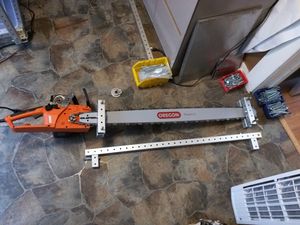Lumber mills: Difference between revisions
No edit summary |
|||
| Line 28: | Line 28: | ||
<gallery> | <gallery> | ||
Chainsaw mounts.jpg| | Chainsaw mounts.jpg| | ||
</gallery> | </gallery> | ||
Revision as of 18:20, 25 April 2021
| Tools: | Wrenches |
|---|---|
| Parts: | Frames, Nuts, Bolts, Plates, End caps |
| Techniques: | Shelf joints, Tri joints |
Challenges
Square profile raw material suitable for producing frames is widely available for a price. Lowering cost and increasing availability requires sourcing raw material from the environment.
Approaches
Most chainsaw motor shafts appear to be 3/8 inch (0.375 inch or 9.525mm) in diameter. 0.404 inch also appears to be available. Clutch drum sprockets can be adapted to 3/8 inch shafts, mounted in collets, in standard spindles.
Chainsaw mills are relatively simple and have the advantage of reusing the chainsaw already needed for felling and limbing the tree. Disadvantages of chainsaw mills typically include more wasted wood than band or circular saws, intense amounts of manual labor, and increased danger compared to automated mills. The Replimat lumber mill attempts to combine advantages of a typical chainsaw mill with increased automation and safety offered by expensive bandsaw mills.
Waste flows
Wood sawdust can be processed by pellet presses for burning in an automatic wood pellet stove.

